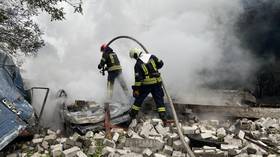Ukraine details damage after nationwide attacks

The Ukrainian government has reported serious damage to the country’s infrastructure following Russian missile attacks on Monday morning. People should expect outages of basic services, Prime Minister Denis Shmigal warned.
“As of 11:00 a.m. 11 key infrastructure objects in eight regions of Ukraine and in Kiev have been damaged,” the head of the cabinet said on social media. “We need to be prepared for temporary interruptions of electricity, water, and telecommunications.”
He repeated the assessment made by President Vladimir Zelensky, that the goal of the strikes was to scare the population, and urged the public to “hold the line.”
On Monday, reports came in from many parts of Ukraine about multiple missile hits. The office of Valery Zaluzhny, the commander-in-chief of the Ukrainian armed forces, claimed that at least 75 missiles were fired at his country, and the air defenses intercepted 41. According to Ukrainian officials, Russia also used kamikaze drones against some targets.
Senior Ukrainian officials and media said the strikes targeted power plants and other elements of the energy infrastructure. Power stations and other key sites in Kiev, Lviv, Kharkov, and Zhitomir Regions were targeted, according to reports.
Ukrenergo, the national power grid operator, claimed its specialists have been “engaging backup supply schemes” and repairing damage after the attacks.
The administration of Kiev Region urged people to charge their devices and stockpile water due to potential disruptions of utilities. Issues with water supply were reported in the cities of Lviv and Kharkov, and in Chernigov and Krivoy Rog Regions.
The capital itself, which is a separate administrative entity, shut down its metro system, as people rushed to the stations seeking shelter.
The Kiev metro has been turned into a bomb shelter pic.twitter.com/jRQnkeOpRZ
— Citizen Free Press (@CitizenFreePres) October 10, 2022
The attacks were apparently not limited to Ukraine’s energy system. The area of Kiev in which the headquarters of the Security Service of Ukraine (SBU) is located reportedly came under fire.
One projectile reportedly landed next to what residents of the capital call ‘the Klitschko bridge’, after Mayor Vitaly Klitschko. His office reported that it spent $7.5 million on the pedestrian walkway, and he personally led the opening ceremony in 2019. Footage from CCTV cameras appears to show the bridge mostly intact after being rocked by the explosion.
⚡more explosions in Kiev.Attack on the "Klitschko bridge".⚡Another series of explosions throughout #Ukraine, it is reported that the attacks are made on government, military, Intel infrastructure pic.twitter.com/Q5xGCV2eGM
— vanessa beeley (@VanessaBeeley) October 10, 2022
The escalation on Monday comes two days after what Moscow called a Ukrainian terrorist attack on the Crimean Bridge, which connects Crimea with the Russian mainland. A powerful explosion on the bridge’s road traffic section killed several civilians and partially collapsed the structure, but fell well short of destroying it.
Senior Ukrainian officials previously claimed that the bridge was a legitimate military target, citing its strategic role for supplying Russian military forces.
Selfies in front of an oversized commemorative stamp depicting the moment that civilians traveling on a civilian bridge were incinerated in an ISIS-style truck bomb attack pic.twitter.com/OGWfAVvZmp
— Michael Tracey (@mtracey) October 10, 2022
Many Ukrainian officials cheered the incident, which apparently involved explosives planted on a cargo truck. Hours after the incident, the national postal service even released a special stamp celebrating the event. People in Kiev were invited to take selfies in front of a giant replica of the stamp.
On Monday, President Vladimir Putin confirmed that Russia launched missile attacks on infrastructure sites across Ukraine in retaliation for what he described as a pattern of “terrorist attacks” against Russian infrastructure.













